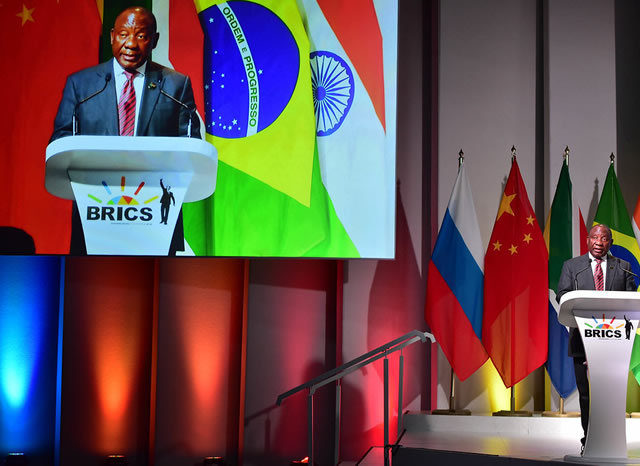
RUSSIA - Expanding the BRICS Bloc
For years, Western critics have dismissed Brics as a relatively inconsequential entity.
But at its annual summit in Russia, the group triumphantly showcased just how far it has come.
Top leaders from 36 countries, as well as the UN Secretary General, attended the three-day event, and Brics formally welcomed four new members—Egypt, Ethiopia, Iran, and the United Arab Emirates. More membership expansions could soon follow. Brics had previously added only one new member—South Africa in 2010—since its inception (as the Bric states) in 2006.
Additionally, Brics enables India to advance its core foreign policy principle of strategic autonomy, whereby it aims to balance relations with a wide spectrum of geopolitical players, without formally allying with any of them.
With Brics gaining momentum, inducting new members, and attracting global discontents, the group is seemingly poised to begin implementing its longstanding vision—articulated emphatically by Beijing and Moscow—of serving as a counter to the West.
Additionally, Brics’ new members include Iran and, possibly further down the road, Belarus and Cuba—suggesting the future possibility of an outright anti-West tilt.
While India aims to balance its ties with the Western and non-Western worlds, it would not want to be part of any arrangement perceived as avowedly anti-West.
The joint statement issued after the recent summit identified a range of plans, including an international payment system that would counter the US dollar and evade Western sanctions.
The most likely outcome to emerge from the recent summit, as suggested by the joint statement, is a Brics commitment to partner on a series of noncontroversial, low-hanging-fruit initiatives focused on climate change, higher education, public health, and science and technology, among others.
These collaborations in decidedly safe spaces would also demonstrate that an ascendant Brics need not make the West uncomfortable. And that would offer some useful reassurance after the group’s well-attended summit in Russia likely attracted some nervous attention in Western capitals.
-www.bbc.com, 25 October 2024
Arno's Commentary
The Western coalition is European based; however, mostly dominated by the USA.
The four main BRICS nations are extremely diverse. India, the world’s largest democracy, places religion as a priority for national identity, while communist China pulls in the opposite direction. Russia’s apparent imperialism is trying to fit a square peg in a round hole. South Africa, of course, is less significant with a tainted background due to the history of apartheid.
When overlooking the various negative aspects, one begins to realize that these gigantic countries are attempting to “counter the West.”
From a Biblical prophetic viewpoint, it nevertheless reveals the hidden highway toward world unity.
Here we are reminded of Psalm 2:1: “Why do the heathen rage, and the people imagine a vain thing?” The adhesive to global unity—in this case, BRICS—is still dominated by one word: merchandise.
This reminds us of Revelation 18:3: “For all nations have drunk of the wine of the wrath of her fornication, and the kings of the earth have committed fornication with her, and the merchants of the earth are waxed rich through the abundance of her delicacies.” Note “all nations.”



